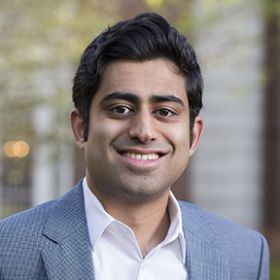People
Rohan Kekre
Rohan Kekre
“We’re fortunate in the Business Economics program that there are very few non-research-related demands on our time after the second year, so we can truly focus on research and learn by doing.”
I grew up in Rochester, NY and came to Harvard College broadly interested in math, but not quite sure of where it would take me. I ended up studying applied math with a focus in economics. What ultimately attracted me to economics, like many others I think, was that it applied rigorous analytical reasoning and quantitative tools to a set of public policy questions having first-order importance in the real world.
After graduation I took a job as a management consultant at McKinsey in their New York office. I started in July 2008, and within two months the floor fell out from under the global financial system. The next two years were an incredible learning opportunity, as I got to serve financial services clients reevaluating business strategy in an extremely challenging economic environment. The experience made me interested in questions of bank regulatory policy and macroeconomic stabilization more generally. After two years, I decided that graduate school would be the best place to engage with these questions at a deeper level, and was fortunate to be admitted to the Business Economics program at HBS.
Research Interests
My research interests are in international macroeconomics and corporate finance (particularly financial intermediation). I’m currently engaged in research on both fronts: the macroeconomic consequences of heterogeneity in labor market institutions across the Eurozone, and the causes and consequences of bank balance sheet management over the business cycle. Going forward, I also hope to explore questions at the intersection of both sub-fields, recognizing the importance of global, leveraged intermediaries in international macroeconomic dynamics.
Business Economics Program
Access to the large number of economists “on both sides of the River” has been incredibly useful in compelling a diversity of perspectives on my research. The resources at HBS have been more generous than I could ever have asked for, including support for research expenses and conferences which has allowed me to be ambitious in my work. Complete integration in coursework, research, and teaching with the graduate students in the Economics Department has enabled me to form close professional and personal relationships with fellow students that I will carry with me well beyond graduate school.
The HBS Experience
The most challenging part has been the transition from consuming research to producing it. I have learned that I am most productive when I focus on one or two projects at a time and solicit feedback from others more frequently than I instinctively would...but I wouldn't have learned these things had I not made mistakes first. We’re fortunate in the Business Economics program that there are very few non-research-related demands on our time after the second year, so we can truly focus on research and learn by doing.
The most rewarding part has been the intellectual environment of economics at Harvard and HBS in particular—which places a premium on research that is highly relevant to the real world. On more occasions than I can remember, an advisor has asked, “Do you really believe that assumption?” or “What empirical evidence is consistent with that?” Being confronted with such questions every day has served as a useful reminder of why I was interested in economics in the first place, and makes all of us more effective researchers.
Advice for Prospective Students
I would encourage you to seriously spend time doing research before starting. This may mean really investing in your undergraduate or master’s thesis as I did, or working as a research assistant for some time after school. In either case, this will have tangible benefits in graduate school, including a familiarity with Stata, Matlab, and/or datasets, and a relationship with a faculty mentor whom you can keep in touch with throughout your doctoral program. More importantly, it will help you start thinking like a researcher early on in your doctoral experience.

